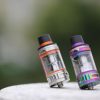THCA, or tetrahydrocannabinolic acid, is a natural compound found in raw cannabis plants. It is the precursor to delta-9-tetrahydrocannabinol (THC), the well-known psychoactive compound responsible for the “high” associated with cannabis use. Know Does THCA Get You High further:
Table of contents:
- Key Takeaways
- What is THCA?
- What is the Difference Between THC and THCA?
- Can You Smoke THCA?
- Is THCA Legal?
- Can THCA Get You High?
- Will THCA Show Up On a Drug Test?
- How Do You Decarb THCA?
- What Is a High THCA Percentage?
- Conclusion
Key Takeaways
- THCA is the non-intoxicating precursor to THC found in raw cannabis.
- When heated or decarboxylated, THCA converts to THC, which is responsible for the psychoactive effects of cannabis.
- Consuming THCA in its raw form will not produce a “high.”
- THCA can be found in raw cannabis, fresh leaves, and some juiced or cold-pressed cannabis products.
- The legality of THCA depends on local cannabis laws and regulations.
What is THCA?
In its natural state, THCA is non-intoxicating, meaning it does not produce the psychoactive effects commonly associated with cannabis consumption. Instead, THCA offers potential therapeutic benefits and may have anti-inflammatory and neuroprotective properties. Some people incorporate THCA into their wellness routines by consuming it in its raw form.
What is the Difference Between THC and THCA?
The primary difference between THC (tetrahydrocannabinol) and THCA (tetrahydrocannabinolic acid) is their psychoactive nature. THC is psychoactive and responsible for the intoxicating effects of cannabis, while THCA is non-intoxicating and does not produce a “high.”
The key distinction lies in the decarboxylation process. THCA needs to undergo decarboxylation, which involves the application of heat, to convert into THC. This conversion occurs naturally when cannabis is smoked, vaporized, or heated during cooking. The heat causes the carboxylic acid group (the “A” in THCA) to be removed, resulting in THC.
Can You Smoke THCA?
In its raw, unheated form, THCA cannot be smoked to produce the typical psychoactive effects associated with cannabis. This is because THCA lacks the psychoactive properties of THC. To experience the “high” associated with cannabis, the THCA in the plant material must be converted into THC through decarboxylation.
However, there is a growing interest in products that preserve THCA and its potential therapeutic benefits. Some individuals juice or cold-press raw cannabis leaves, which can contain THCA, to benefit from its potential anti-inflammatory and wellness-promoting properties without experiencing a high. These preparations do not involve heating or decarboxylation, allowing THCA to remain in its natural state.
Is THCA Legal?
The legality of THCA, like other cannabis compounds, varies depending on local cannabis laws and regulations. In regions where cannabis is legal for medical or recreational use, products containing THCA may be available. However, these products typically have specific labeling to indicate their THCA content and are subject to regulatory oversight.
In areas where cannabis is illegal or strictly regulated, THCA may also be prohibited. It’s crucial to research and understand the specific cannabis laws in your region to determine the legal status of THCA-containing products.
Can THCA Get You High?
The short answer is no, THCA does not get you high in its raw, unheated form. THCA is non-intoxicating, which means it does not produce the psychoactive effects commonly associated with cannabis use. To understand why, we need to look at the process of decarboxylation.
Decarboxylation is the chemical reaction that converts THCA into THC. It occurs when cannabis is exposed to heat, such as when it’s smoked, vaporized, or heated during cooking. During decarboxylation, the carboxylic acid group (the “A” in THCA) is removed, resulting in the formation of THC.
So, if you were to consume raw cannabis, THCA would be the dominant compound, and you would not experience a high. However, when you heat or cook cannabis, you activate the THCA, converting it into THC, and that’s when the psychoactive effects become evident.
Will THCA Show Up On a Drug Test?
THCA itself is unlikely to show up on a standard drug test. Most drug tests, including urine tests, are designed to detect THC, the psychoactive compound produced after the decarboxylation of THCA. THCA is not typically a target of drug tests because it does not cause intoxication.
However, it’s important to note that some highly sensitive drug tests may detect trace amounts of THCA, especially if you’ve consumed large quantities of raw cannabis or THCA-containing products. If you are concerned about drug testing, it’s best to be cautious and mindful of your cannabis consumption choices.
How Do You Decarb THCA?
To decarboxylate THCA and convert it into THC, you need to apply heat. Here’s a simple process for decarbing THCA:
- Preheat your oven: Set it to 220-240°F (105-115°C).
- Prepare your cannabis: Break it into smaller pieces or grind it to maximize surface area.
- Spread the cannabis: Place the prepared cannabis on a baking sheet lined with parchment paper.
- Decarb in the oven: Place the baking sheet in the preheated oven for about 30-45 minutes. Keep an eye on it and stir occasionally to ensure even decarboxylation.
- Cool and use: Once the cannabis has cooled, it’s ready to use in various recipes, such as edibles, tinctures, or other infused products.
This process activates the THCA, transforming it into THC, which can then be used for its psychoactive effects.
What Is a High THCA Percentage?
THCA percentage in cannabis refers to the concentration of THCA in the plant material. A high THCA percentage means that a significant portion of the cannabinoids present in the cannabis strain is in the form of THCA.
The importance of THCA percentage varies depending on your intended use. If you’re looking for the psychoactive effects associated with THC, a high THC percentage is what you’d seek in a strain. However, if you’re interested in the potential therapeutic benefits of THCA without the high, a high THCA percentage would be more relevant.
THCA-dominant strains, which have a high THCA percentage, are becoming increasingly popular among individuals seeking the potential health benefits of THCA while avoiding the intoxicating effects of THC.
Conclusion
In summary, THCA, the precursor to THC in raw cannabis, does not produce a “high” when consumed in its natural form. Only through the process of decarboxylation, which involves heating the cannabis, does THCA convert into THC and become psychoactive.
THCA is unlikely to show up on standard drug tests, as drug tests typically target THC. However, highly sensitive tests may detect trace amounts of THCA, so it’s essential to be aware of your consumption choices if you are concerned about drug testing.
If you want to experience the psychoactive effects of cannabis, look for strains with high THC percentages. On the other hand, if you’re interested in the potential therapeutic benefits of THCA without the high, consider exploring THCA-dominant strains. Ultimately, your choice should align with your desired effects and wellness goals.
Disclaimer – The contents of this article are provided solely for informational purposes and should not be considered medical advice. It is important to note that the information presented here is not meant to diagnose, treat, cure, or prevent any disease. Prior to embarking on any new health-related regimen, Always consult your healthcare provider before trying new supplements or treatments. Keeping you safe and well is our top priority. Additionally, it’s important to note that the FDA has not endorsed any claims regarding the health benefits of cannabis. Delta8Hub makes no guarantees or warranties regarding the accuracy, completeness, or usefulness of any messages contained here in.

